July 6, 2000:A-bomb page on Radio Japan
|
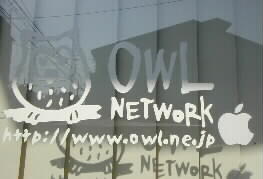 |
I came up to Mr. Matsumura's office together with my husband in the afternoon.
|
The man who was waiting for us over there was Mr. Terauchi, a director of Japan Broadcasting Corporation's International Planning and Broadcasting Department. He came down to Oita in order to collect the data of a homepage "A-Personal Record of Hiroshima A-bomb Survival."
Mr. Matsumura, who had been a student of the late Takeharu Terao, feared that Mr. Terao's precious sayings or remarks released in a personal computer communication board
of COARA might have been lost, and he decided to record them on a web site. The homepage has appealed to many people around the world and many responses have been sent to the site since then.
|
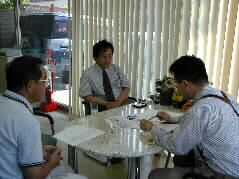 |
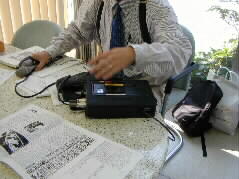 |
An A-bomb experience in Hiroshima was released on a homepage in a local city Oita.
The homepage is written in Japanese and in English.
The experience was adopted in a textbook of a Korean college.
|
| Above mentioned facts attracted the attention of the Corporation. A special program "Internet hands down an A-bomb experience to the next generation" will be aired on August 6 ( Hiroshima A-bomb Day) in 22 languages from Radio Japan. The program will include interviews that contributed to the homepage.
|
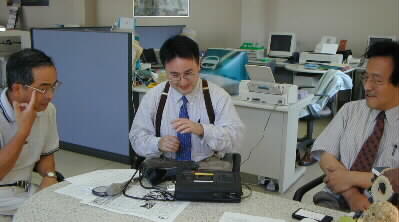 |
| From left: my husband Nagano who translated the homepage, Mr. Terauchi, and Mr. Matsumura -the editor- prepare for the recording.
|
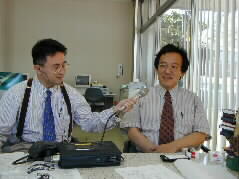 |
Mr. Matsumura tells the impression of the late Mr. Terao and the passion of making the page. |
| "I got acquainted with the late Mr. Terao through the PC communication. I concessionary met him in off-line-meetings. I was very moved by his writings contributed to a BBS 'Children Rearing'. I wanted to appeal the messages left by the deceased worldwide. This is why I offered to be involved in the translation", my husband comments.
|
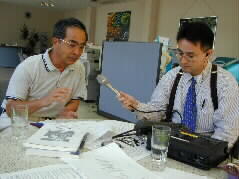 |
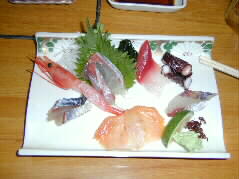 |
The collection was over in success.
All of us came up to downtown Oita. We visited a Japanese restaurant Hashimoto, hoping that Mr. Terauchi from Tokyo all the way will fully enjoy the taste of Oita.
The first dish is fresh fish of famous Seki- horse mackerel and Seki- mackerel.
|
| The next dish is unusual meat called Basashi.
|
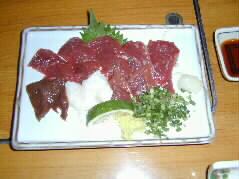 |
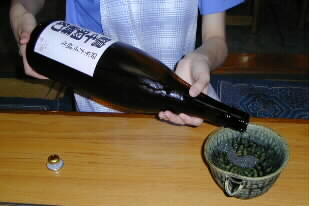 |
| After the toast with beer, we enjoyed local drinks such as "Special Ginjou Senbatsuru Mugen brewed in Kujyu" and other brands.
|
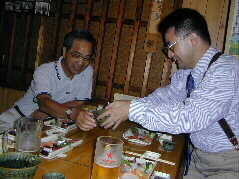 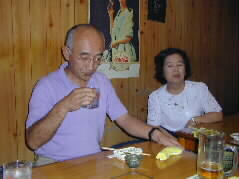 |
| The web site was also published in a paperback. Mr. Kuboki who designed the cover of the book joined us in the restaurant. He was very busy in daytime today.
|
| "Mention the word Kyushu, and most people think of Shouchu." Matsumura brought up a bottle of special Shochu "Usa Mugi." Mr. Terauchi and my husband enjoyed it and asked another cup frequently.
|
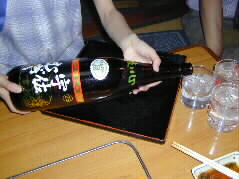 |
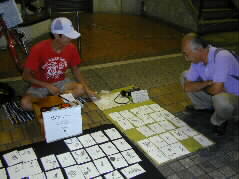 |
A pleasant exchange was over. A weekday night goes on quietly in the arcade. We found a guy selling hand-written poster card on the pavement. "Hi! Teacher Kuboki!" Surprisingly, it was a student of Mr. Kuboki.
I bought lovely two cards. To whom shall I write?
To my foreign friends who may help making the radio program?
|
| In this way, the wish of the late Mr. Terao will further spread all over the world. I am very delighted.
|












